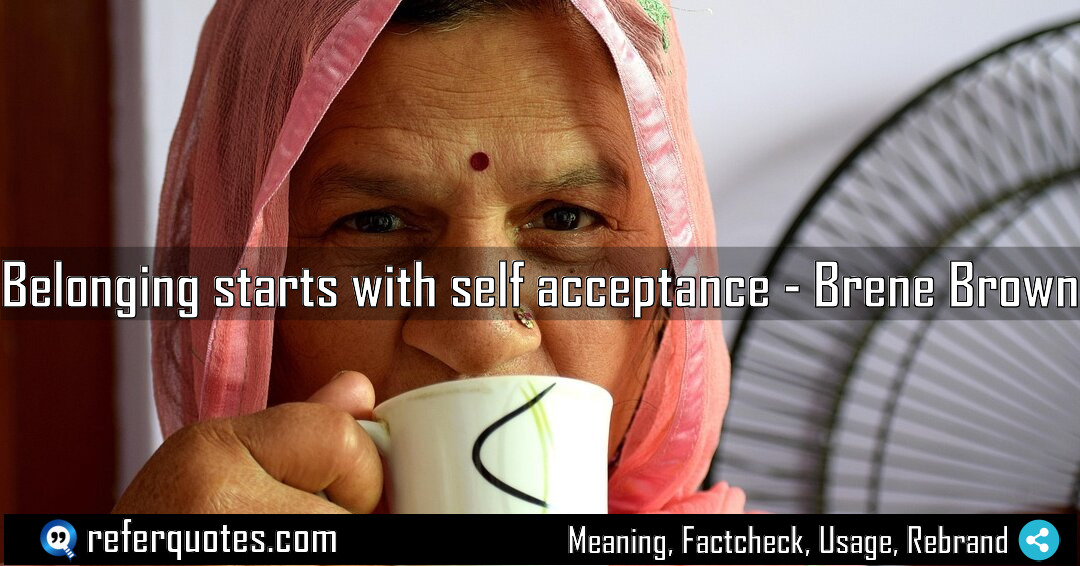
Belonging starts with self acceptance is a truth I’ve seen play out time and again. It’s the foundational key to genuine connection, turning our focus inward before we can truly connect outward.
Share Image Quote:
Table of Contents
Meaning
The core message is that you can’t find a true sense of belonging with others until you first find a way to belong to yourself, to accept who you are.
Explanation
Here’s the thing we often get backwards. We hustle for acceptance from groups, partners, colleagues, hoping that their approval will make us feel like we’re enough. But Brown flips the script. She argues that real, lasting belonging—the kind that doesn’t require you to change who you are—can only happen when you stop outsourcing your self-worth. When you can look in the mirror and truly accept the imperfect, messy, authentic person staring back, that’s when you show up in the world from a place of wholeness, not lack. And that wholeness is magnetic. It’s what allows for genuine connection.
Quote Summary
Reading Level32
Aesthetic Score74
Origin & Factcheck
This powerful line comes straight from Brené Brown’s 2010 book, The Gifts of Imperfection, which was published in the United States. It’s a cornerstone of her research on vulnerability and wholehearted living. You won’t find it attributed to anyone else because it’s pure, researched Brené.
Attribution Summary
Author Bio
Dr Brene Brown is the author of books such as Daring Greatly and The Power of Vulnerability. The TED talk and Netflix production based on her research reached out to millions of audience. She researches effects of courage and vulnerability in shaping people's work and relationships. She leads the Brené Brown Education and Research Group and provides evidence-based insights into practical tools to help people train themselves
Official Website |Facebook | X | Instagram | YouTube |
Where is this quotation located?
| Quotation | Belonging starts with self acceptance |
| Book Details | Publication Year/Date: 2010; ISBN/Unique Identifier: 9781592858491; Last edition. Number of pages. |
| Where is it? | Approximate page from 2010 Hazelden edition |
Context
In the book, she makes a crucial distinction between “fitting in” and “belonging.” Fitting in is about assessing a situation and becoming who you need to be to be accepted. Belonging, the real stuff, is about showing up as you are and being accepted for that. This quote is the bridge between those two ideas. It’s the “how.”
Usage Examples
Let me give you a couple of scenarios where this lands.
- For a leader struggling with imposter syndrome: Instead of trying to mimic a leadership style that isn’t you, this quote is a reminder that your team will connect with your authentic self, vulnerabilities and all. Your belonging as a leader starts with you accepting that you are, in fact, the right person for the job.
- For someone in a new social circle: If you’re constantly editing your opinions or hiding your quirky hobbies, you’re fitting in. This idea pushes you to share a bit of your true self. The right people—the ones you actually want to belong with—will respond to that realness.
- For a creative person afraid to share their work: The fear is often rooted in a lack of self-acceptance. Embracing this concept means creating for the joy of it, first. Belonging to the “tribe of artists” starts with you accepting your own creative voice.
To whom it appeals?
Share This Quote Image & Motivate
Motivation Score80
Popularity Score82
Shareability Score84
FAQ
Question: Does self-acceptance mean you stop trying to improve?
Answer: Not at all. It’s the opposite, actually. Self-acceptance is the solid foundation from which you can grow. You can’t fix a problem you won’t admit you have. Acceptance gives you the clarity and courage to change from a place of self-love, not self-loathing.
Question: What if I accept myself but still feel like I don’t belong?
Answer: That’s a great point. Self-acceptance is the *start*, not a magic wand. It’s the ticket to the game, but you still have to play. It allows you to seek out and build communities where you *can* belong, rather than desperately trying to mold yourself to fit into spaces that were never right for you.
Question: How is this different from just being selfish?
Answer: Selfishness is about putting your needs above everyone else’s. Self-acceptance is about honoring your own needs and worth so you can show up *more* authentically and generously for others. It’s about filling your own cup so you have something to offer. It’s the least selfish work you can do.
Similar Quotes
You know, Brene Brown really nailed it when she said “Because true belonging only happens when we present our authentic…” It’s a simple but powerful truth: you can’t truly fit…
True belonging is not about fitting in—it’s a profound shift from performing for acceptance to being valued for your authentic self. This is the core insight from Sebastian Junger’s work…
Belonging is not fitting in. It’s about showing up authentically, letting yourself be truly seen, and daring to be known for who you are, not who you think you should…
You know, I’ve been thinking a lot about that Brene Brown quote, “Belonging is the opposite of fitting in.” It’s one of those ideas that hits you differently the longer…
Our sense of belonging can never be greater… it’s a truth bomb that flips the script on how we connect. You don’t find belonging out there; you build the capacity…
